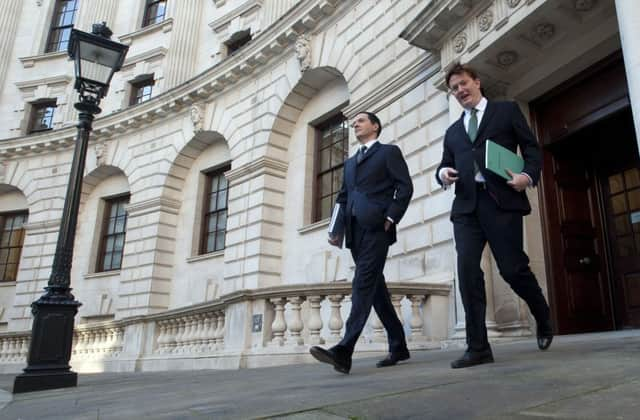Osborne clobbers tech giants and big banks


Chancellor George Osborne said the tax avoidance clampdown will raise £5bn over the next five years.
From April, the Treasury will introduce a 25 per cent tax on profits generated by multinationals from economic activity in the UK which they then artificially shift out of the country.
Advertisement
Hide AdAdvertisement
Hide AdThe tax avoidance loophole has been nicknamed the “Google tax” because the arrangement - involving payments between different parts of a company to shift profits from higher-tax countries to those with lower taxes - is widely used by technology firms.
A Financial Times analysis of seven US technology giants found they paid just £54m in UK corporate tax in 2012.
Mr Osborne said the Diverted Profits Tax will raise more than £1bn over the next five years.
The move marks a change in tone from the Government which has been accused of cosying up to tax-avoiding tech giants.
Advertisement
Hide AdAdvertisement
Hide AdThe Institute of Directors warned that much-needed foreign direct investment into the UK would be threatened by “the inevitable uncertainty in how the detailed provisions will be applied”.
The Chartered Institute of Taxation said the timing of changes should be carefully planned to ensure they are implemented at the same time as other countries to ensure the UK is at a competitive disadvantage.
Toby Ryland, partner at accountants HW Fisher & Company, said: “The Chancellor has made the right noises, but most multinationals will be able to side-step these new rules without breaking into a sweat.”
Amazon, Google and Facebook, which have all faced criticism over their UK tax arrangements, did not respond to calls for comment.
Advertisement
Hide AdAdvertisement
Hide AdMr Osborne also announced a crackdown on the way banks are able to offset all their losses from the financial crisis against tax on profits for years to come, meaning that some banks might not be paying tax for 15 or 20 years.
Mr Osborne said: “That’s totally unacceptable. The banks got public support in the crisis and they should now support the public in the recovery.”
This move is expected to contribute almost £4bn more in tax over the next five years.
From April, the Government will restrict the amount of banks’ profits that can be offset by carried forward losses to 50 per cent, increasing their contribution to public finances through their tax payments.
Advertisement
Hide AdAdvertisement
Hide AdShares in Barclays, Lloyds and RBS fell following the announcement. Yorkshire and Clydesdale are less likely to be affected as their UK banking operations remained profitable during the financial crisis.
Anthony Browne, chief executive of lobby group the British Bankers Association, said banks contribute more than £25bn each year to the nation’s finances - enough to pay the salaries of around half a million nurses.
He added: “It is absolutely right that this important industry pays its fair share of tax, but it is important to note that where banks have offset losses they have done so legally, just as all other businesses can.”
Mr Browne said the financial services industry - a major employer in Yorkshire - would work with the Treasury to implement the new rules.
Advertisement
Hide AdAdvertisement
Hide AdChris Hearld, northern chairman at accountancy firm KPMG, said the banks “got clobbered again” and along with multinationals artificially diverting profits were the big losers in the Autumn Statement.
Mr Hearld warned that the cap on offsetting losses could reduce the amount of cash available for lending.